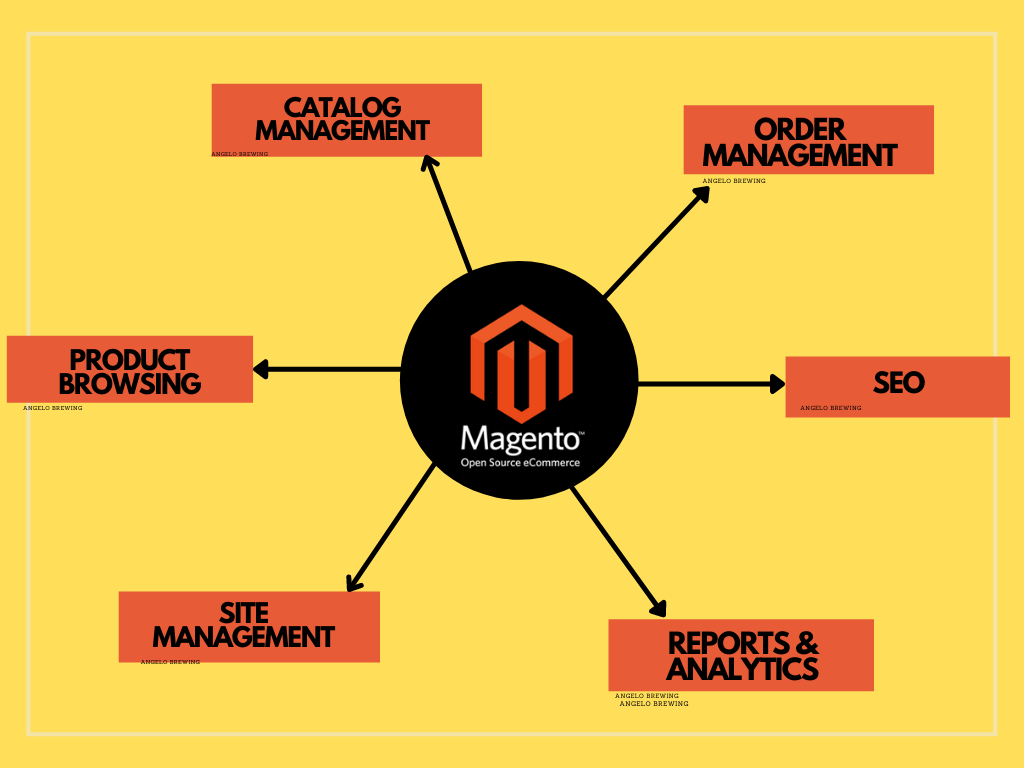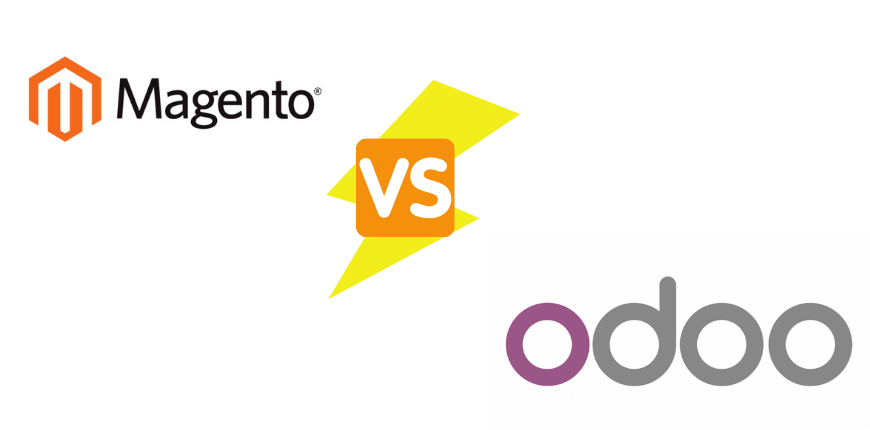As today’s technology progresses, business owners have more options to choose from when it comes to applications that assist with management. Today, we’re giving you a closer look at two of the most prevalent software for e-commerce: Odoo and Magento. Keep on reading if you want to find out the winner in this match of Odoo vs Magento.
Introduction About Odoo and Magento
Table of Contents
Before diving into this Magento vs. Odoo comparison, let’s get to know them and take a look at some of their overall features.
What Is Magento?
Magento eCommerce is an open-source platform that helps enterprises manage their business more efficiently. Operating on an open-source system, Magento is specifically designed to meet the needs of online store owners. It is ranked as one of the most popular eCommerce platforms and is used by many enterprises worldwide. In 2015, Magento 2 was released with an improvement in functionality and features to catch up with the latest development practices to benefit the system’s future growth.
Features of Magento

As one of the leading platforms for eCommerce, Magento offers some helpful features for business owners:
Catalog Management: For online shopping, the catalog plays a significant role. With Magento, you can showcase your products in many forms such as simple, virtual, configurable, or downloadable. The system also allows you to add limitless product attributes, edit or delete product reviews as well as easily import and export your products.
Order Management: Magento also provides help with the process of order management. You can create and edit orders, print invoices, label shipping tags, and many more.
Analytics and Reporting: Magento is embedded with Google Analytics to provide you with the most accurate reports. Furthermore, you can also choose from an array of default reports such as Sales reports, Tax reports, Low stock reports, Search term reports, and much more data for you to discover.
SEO: Using Magento, you won’t have to worry much about the optimization of search engines. The platform has built-in SEO tools that automatically help with the ranking of your page. Some useful SEO features include:
- Google sitemaps generation for convenient website navigation
- Meta tags and URLs easy to adjust
- Parameters (such as index, page traffic,..) management
Along with those features above, you can read: What Is Magento ECommerce and All You Need to Know About It
What Is Odoo?
Odoo ERP is an Enterprise Resource Planning system that helps business owners manage their work easier and more efficiently. It operates on an open-source system which means you can modify the code of its program to fit your specific needs. However, you may need the help of some specialists in order to do this.
Features of Odoo
Founded in 2005, Odoo has a collection of applications and modules that can help manage your business. Below are some highlighted features of Odoo:
Manufacturing: If you own a factory, then Odoo can help you manage your assembly line and/or manufacturing operations. It also notices your manufacturing department about the quality check of end products.
CRM: Odoo provides a dashboard with a record of your sales activities. Moreover, this software offers tips and advice on how to execute your own CRM plan strategically.
Inventory: With double-entry inventory management, Odoo allows you to track both the raw materials from your suppliers and the orders delivered to the customers. You can create an order with or without a barcode scanner.
Accounting: Odoo automatically handles the process of creating an invoice so you can save time and effort. It also assists with tracking your assets and depreciation with a preprogrammed board, generating amortization entries, and basically everything that relates to the management of assets.
Comparison: Odoo vs Magento
Both platforms have their own pros and cons. To help you understand more about these two platforms, here are some comparisons of Magento vs Odoo that you can take into account when making a choice for your business. After reading this Odoo eCommerce vs Magento comparison, we hope you can finally select the right platform that suits your needs.
#1. Functionalities
When comparing the SEO performance of Odoo vs Magento, Magento has a wide range of features that support online stores. However, some other functions, especially when it comes to operation management, will have to be installed via extensions. But this is surely not a big problem because there are many available solutions on the market that can directly address the specific needs of your business.
Positioning itself as an all-in-one Enterprise Resource Planning platform, Odoo provides its users with many built-in features from operation management to frontend functions. No add-ins required is undeniably one of Odoo’s strongest strengths.
#2. SEO

Magento is an SEO-friendly platform. It provides a wide range of features to assist with the SEO of your page. With the aforementioned SEO features, your website could attract more traffic, improve its ranking and easily track customers’ activities.
Odoo also supports its users with the optimization of search engines. It even offers some features that Magento lacks, which are inline SEO suggestions and link trackers.
#3. Set up and Customization
Magento may require some effort to set up at the beginning. You should hire an expert to take care of this. The good thing is it is easy to find a certified developer with a thorough knowledge of Magento because the platform is very popular in the industry.
BSSCommerce is one of the most reputable Magento partners, offering top-class Magento eCommerce development services. With over 11 years of expertise, we promise to deliver the best project outcomes to Magento clients around the world
Odoo doesn’t require any professional help to set up and you can take advantage of other supportive apps in the Odoo store to enhance your website.
#4. Integration and Extensions
As mentioned before, there are many Magento 2 modules on the marketplace. It is easy for business owners to find a third-party provider whose extensions are suitable for their needs. Magento is also very scalable, which would be helpful for enterprises that want to expand their business.
When it comes to the extensions or integrations of Odoo vs Magento, Odoo offers many features for its users to choose from so you may not have the need to look for any extensions. But if you want to apply some add-ins, it would be a little bit difficult and require professional help.
#5. Support
Known as one of the most popular platforms for e-commerce, Magento has a network that spreads globally with many sources of support. No matter where you are, you can easily find help when facing problems relating to this platform.
From the developer’s point of view, it is a little bit more complex when dealing with Odoo. The community of support for this platform is also narrower making it more difficult to reach out for help. But as its network grows bigger, Odoo may become easier to access in the future.
6. Pricing
Magento offers both free and paid versions for you to choose from. The commerce versions won’t be able to provide some of the advanced features such as B2B sales. On the other hand, with the enterprise and cloud versions of Magento, you can enjoy many amazing features that are designed specifically to assist your online store. The fee for these paid versions starts from $22.000 a year and will change based on your annual revenue. You can also add other extension options and this will be charged separately.
In addition, check out this Magento costs article from the BSS Commerce team to dive into more detailed and helpful information.
Similar to Magento, you can choose to pay to use Odoo or use it for free. The charge would be based on how many users and the features they want to have access to Odoo has a 15-day free trial for you to check out and consider before switching to the paid version. The average fee rate starts from $130 a year for one user.
Odoo vs Magento: The Final Verdict

There is no clear winner for the match of Odoo vs Magento. When choosing a platform, it all comes down to what suits your business needs and purpose.
If you are a small to medium enterprise, Odoo and its enterprise resource planning features would be very helpful. Odoo also helps with an e-commerce business, but it’s not the main strength of this platform.
On the other hand, Magento is designed to focus on the e-commerce field. It’s most suitable for medium and large-scale enterprises who want to expand their business. And most importantly, no matter what size your business is, if you want to extend your business to the online environment, Magento should be the first name on your list.
We hope that this Magento vs Odoo article has provided you with valuable insights about the two platforms. If you are looking for a more advanced solution to build or customize your eCommerce store while using Odoo or Magento, you can refer to our services:
By the way, if you’re a merchant wondering which is the best B2B platform for your business, then you can’t skip the most detailed comparison chart of Magento vs Shopify vs BigCommerce – three giants in the eCommerce world. Simply leave your email and we will deliver the best resource to you!

